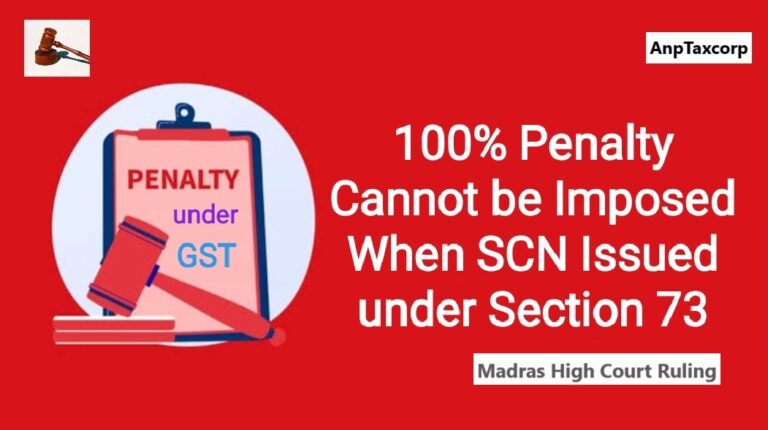Madras High Court Ruling: 100% Penalty not Leviable when SCN Issued under Section 73
Penalty under GST: In a recent decision by the Hon’ble Madras High Court on January 31, 2024, in the case of K.S. Janarthanam v. Deputy State Tax Officer [W.P. No. 1848 of 2024], it was held that a 100% penalty cannot be imposed when a Show Cause Notice (SCN) is issued under Section 73 of the Tamil Nadu Goods and Services Tax (TNGST) Act, 2017.
Background
The petitioner, K.S. Janarthanam, a civil works contractor registered under GST, received a notice in Form GST-ASMT-10 regarding discrepancies in the returns filed. Subsequently, a notice under Section 73 of the TNGST Act was issued to the petitioner. The Revenue Department passed an assessment order on September 4, 2023 (“the Impugned Order”), levying a 100% penalty.
Unsatisfied with this order, the petitioner approached the Hon’ble Madras High Court by filing a writ petition.
Key Issue
The main question before the court was whether a penalty of 100% could be imposed when a Show Cause Notice (SCN) is issued under Section 73 of the TNGST Act.
Madras High Court’s Ruling
In the W.P. No. 1848 of 2024, the Hon’ble Madras High Court made the following rulings:
The court opined that the Impugned Order, imposing a 100% penalty on the SGST dues after issuing a notice under Section 73 of the TNGST Act, needed intervention.
The Impugned Order was quashed, thereby disposing of the writ petition.
The case was remanded back to the assessing officer for a reconsideration of the penalty imposed under the Impugned Order.
Section 73 of the TNGST Act
Section 73 of the Tamil Nadu Goods and Services Tax Act, 2017, deals with the resolution of cases where tax is not filed, short-paid, incorrectly refunded, or where input tax credit is incorrectly claimed or utilized for any reason other than wilful misstatement or suppression of facts.
According to Section 73(9) of the Tamil Nadu Goods and Services Tax (TNGST) Act, after considering any representation made by a person subject to taxation, the authorized officer shall specify the amount of tax, interest, and a penalty equal to 10% of the tax amount or 10 thousand rupees, whichever is greater, due from that individual and issue an order accordingly.
Conclusion
In accordance with this ruling, businesses and taxpayers must take note of the conditions under which penalties can be imposed under the GST Act in other states
This decision by the Madras High Court provides clarity on the application of penalties under Section 73 of the TNGST Act, ensuring a fair and just procedure for taxpayers.
For businesses operating under the purview of the TNGST Act, it is crucial to stay updated with such legal developments to ensure compliance and avoid unnecessary penalties.
This ruling emphasizes the importance of proper procedures and adherence to the provisions of the TNGST Act, benefiting both taxpayers and the tax administration.
Also Read: 20 Arrested in Massive Fake Billing Scam of Hundreds of Crores
Read More
GSTN Advisory 624: Launching of revamped e-invoice master information portal
Failure in Replying SCN Cannot Forfeit the Right to Personal Hearing U/S 75(4): Allahabad HC

hiI like your writing so much share we be in contact more approximately your article on AOL I need a specialist in this area to resolve my problem Maybe that is you Looking ahead to see you